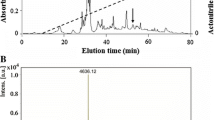Abstract.
Antimicrobial peptides are effector molecules of the innate immune response of all pluricellular organisms, providing them with first-line defence against pathogens. Amphibian skin secretions represent one of the richest natural sources for such peptide antibiotics, and temporins, a large family of antimicrobial peptides from frog skin, are among the smallest ones found in nature to date. Their functional role and modes of action have been described, along with their interesting and unique properties. These properties make temporins good molecules for an in-depth understanding of host defence peptides in general. Furthermore, they are attractive templates for the future design of new therapeutics against infectious diseases with new modes of action, urgently needed due to the increasing resistance of microorganisms to the available drugs.
Similar content being viewed by others
Author information
Authors and Affiliations
Corresponding author
Additional information
Received 8 November 2005; received after revision 19 December 2005; accepted 18 January 2006
Rights and permissions
About this article
Cite this article
Mangoni, M.L. Temporins, anti-infective peptides with expanding properties. Cell. Mol. Life Sci. 63, 1060–1069 (2006). https://doi.org/10.1007/s00018-005-5536-y
Published:
Issue Date:
DOI: https://doi.org/10.1007/s00018-005-5536-y




